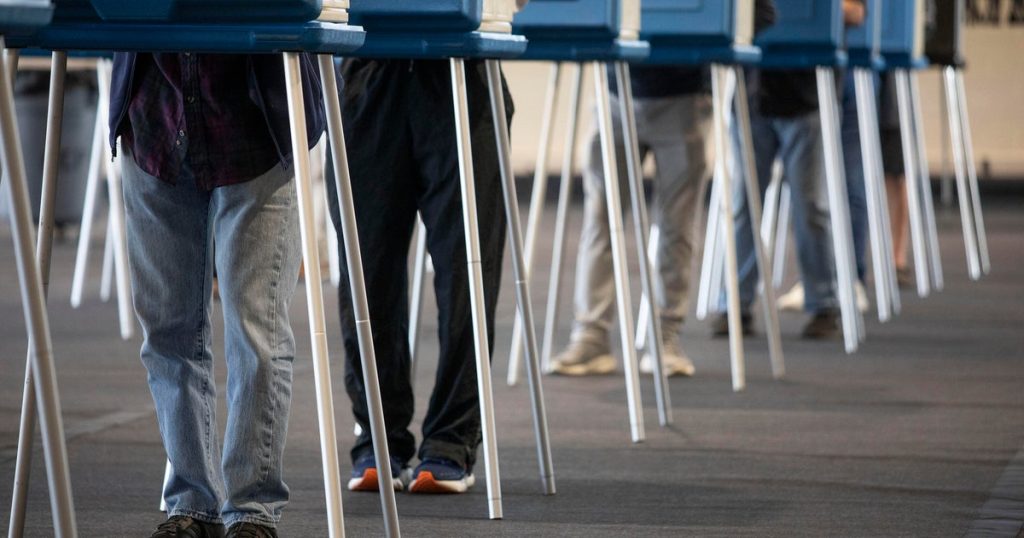A Chinese national, Haoxiang Gao, has been charged with illegal voting while attending the University of Michigan. Recently unsealed court documents reveal that Gao fled the United States after his involvement in the 2024 general election came to light. The case highlights ongoing concerns about noncitizen voting in the U.S., especially as investigations continue into this rare occurrence.
| Article Subheadings |
|---|
| 1) Background of the Incident |
| 2) Legal Proceedings Against Gao |
| 3) Flight Details and Current Status |
| 4) Implications of Noncitizen Voting |
| 5) The Broader Context of Election Integrity |
Background of the Incident
The incident involving Haoxiang Gao occurred in late October 2024 while he was enrolled as a student at the University of Michigan in Ann Arbor. Reports surfaced about a student allegedly casting an illegal vote during the 2024 general election, prompting campus safety officials to investigate. According to court documents filed by the Federal Bureau of Investigation (FBI), parking scrutiny revealed that Gao had registered to vote illegally. He admitted to voting at a designated polling location on campus on October 27, 2024.
After his interactions with safety officials, he faced significant legal repercussions. Gao’s actions marked a notable incident in the ongoing debates about voting rights and regulations concerning election integrity, particularly as it pertains to noncitizens and their eligibility to vote in U.S. elections.
Legal Proceedings Against Gao
Upon discovery of his illegal voting, authorities took immediate action against Gao. He was officially charged by the state on October 30 with one count of unauthorized elector attempting to vote, as well as making a false affidavit to secure voter registration. During a court appearance, a judge mandated that he surrender his Chinese passport and remain within Michigan until further proceedings.
Court records indicate that the passport he handed over bore a serial number ending in “1332.” Despite the judicial order, Gao missed subsequent court dates on March 6 and April 24, prompting a warrant for his arrest. His noncompliance with court orders raised further concern about his intentions and potential flight from justice.
Flight Details and Current Status
In an unexpected turn of events, the FBI revealed that Gao successfully boarded a Delta flight from Detroit International Airport to Shanghai, China, on January 19. Notably, he utilized a Chinese passport with a different serial number ending in “7137.” The incident has raised eyebrows among legal experts, particularly given the existing legal framework regarding extradition; the U.S. does not have an extradition treaty with China, complicating any efforts to bring him back for trial.
His departure from the U.S. continues to be a significant aspect of the case, as federal authorities consider the implications of his flight in relation to the charges pending against him. Discussions around the potential for his return to the U.S. remain uncertain, given the complexities involved in international legal agreements.
Implications of Noncitizen Voting
The case has sparked renewed discussions surrounding the implications of noncitizen voting in U.S. elections. Although instances of such voting are rare, they raise critical concerns about election security and voter integrity. According to the Brennan Center for Justice, a nonpartisan organization, only 30 cases of noncitizen voting have been documented among 23.5 million votes cast during the 2024 general election across various jurisdictions.
These statistics contribute to the broader narrative of whether such actions are isolated incidents or indicative of larger systemic issues. Advocates for tighter voting regulations point to such cases as justification for more stringent measures to prevent noncitizens from participating in elections, arguing that even a handful of cases can erode public trust in the electoral process.
The Broader Context of Election Integrity
As discussions around electoral integrity become increasingly prominent, the Gao case serves as a flashpoint for debates regarding voter registration processes and the criteria necessary for citizen participation in elections. Critics of stringent voting regulations claim that these measures can lead to disenfranchisement among eligible voters, asserting that focusing on preventing rare incidents of noncitizen voting detracts from necessary reforms aimed at enhancing voter access.
The concerns surrounding noncitizen voting are matched by calls for more inclusive policies that protect the rights of all eligible voters. As states continue to navigate this intricate landscape, it is essential to balance security measures with the imperative of upholding democratic participation.
| No. | Key Points |
|---|---|
| 1 | Haoxiang Gao was charged with illegal voting while attending the University of Michigan. |
| 2 | Gao admitted to casting a vote on October 27, 2024, despite being a noncitizen. |
| 3 | He fled the U.S. after missing court appearances, complicating legal proceedings. |
| 4 | The U.S. does not have an extradition treaty with China, complicating possible prosecution. |
| 5 | The case highlights ongoing debates about election integrity and the impact of noncitizen voting. |
Summary
The case of Haoxiang Gao underscores the complexities surrounding election integrity and the challenges of regulating noncitizen voting in the United States. With legal proceedings hindered by his flight from prosecution, the broader implications of such cases continue to fuel discussions on electoral policy and security reforms. Policymakers and advocates must navigate the delicate balance between ensuring safe and secure elections while fostering an inclusive democratic process.
Frequently Asked Questions
Question: What were the charges against Haoxiang Gao?
Haoxiang Gao was charged with unauthorized elector attempting to vote and making a false affidavit for voter registration.
Question: Why is the case significant?
The case is significant as it highlights the rare occurrence of noncitizen voting in U.S. elections, fueling debates about voting rights and election integrity.
Question: What are the legal implications of Gao fleeing to China?
Gao’s flight complicates the legal proceedings against him, as the U.S. does not have an extradition treaty with China, making prosecution difficult.
